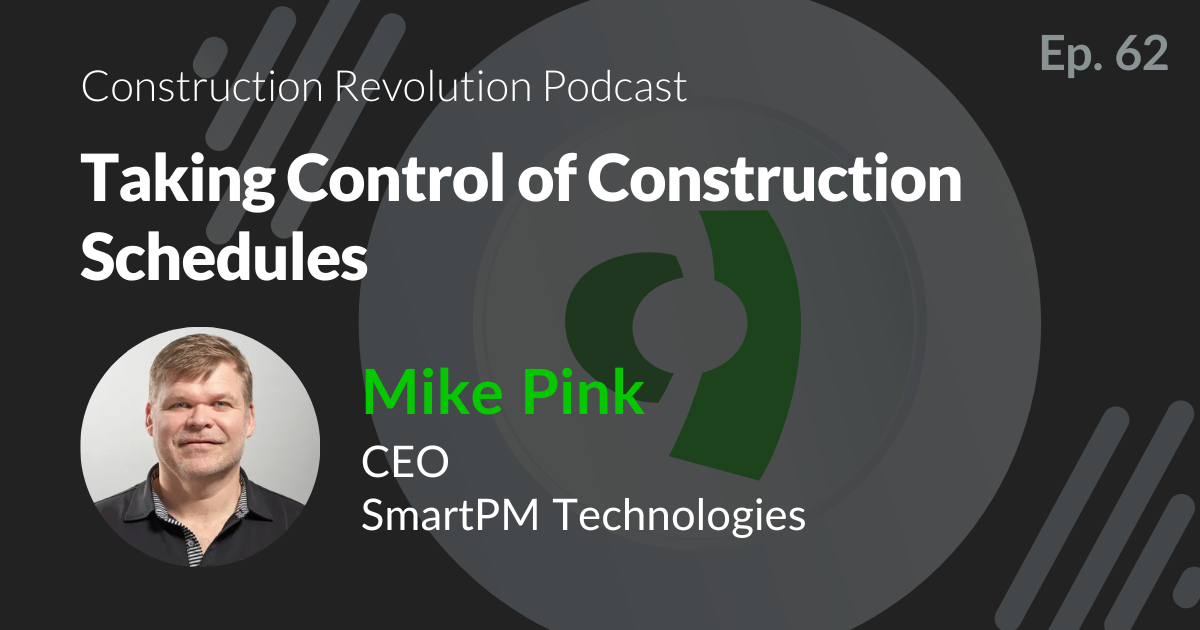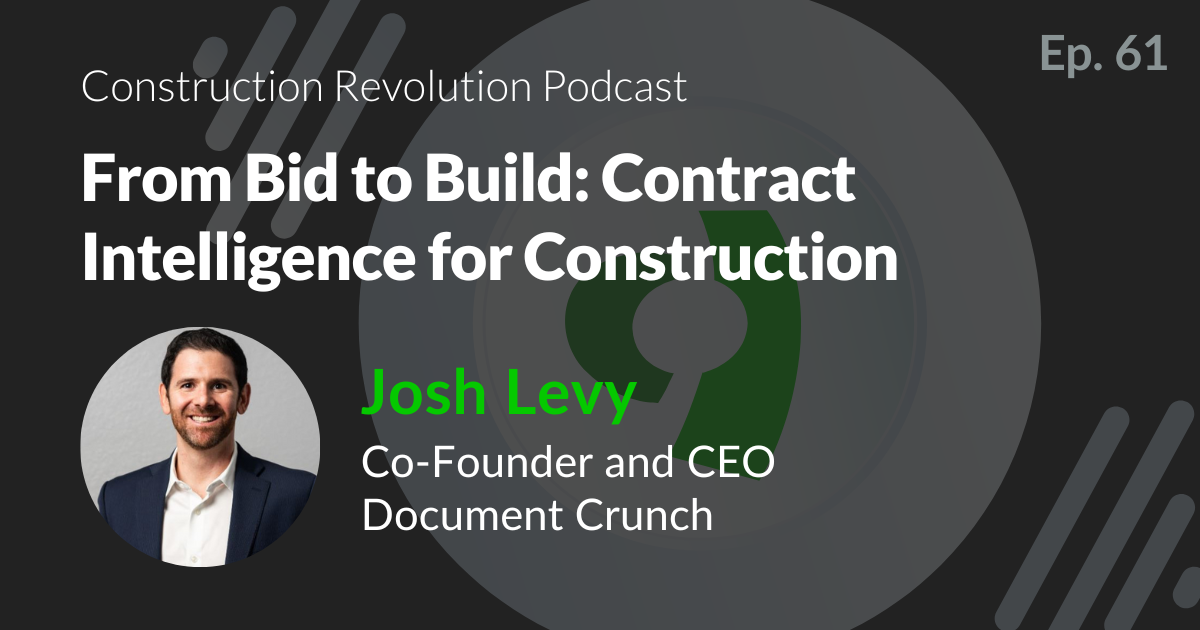
Episode 51 |
October 24, 2024
Maximizing Profit Margins for Construction Businesses
Subscribe to the Construction Revolution Podcast on Your Favorite Platform:
In This Episode
In this episode of The Construction Revolution Podcast, Steven Rossi sits down with Elizaveta Taylor, founder of Beyond Books Solutions. With extensive experience in construction accounting and advisory services, Elizaveta is dedicated to helping construction business owners save time, money, and increase their profits. Tune in as Elizaveta discusses the common financial challenges faced by construction companies, shares strategies for maximizing profit margins, and offers expert advice on cash flow management. From overcoming money mindset blocks to optimizing QuickBooks for construction businesses, this episode is packed with valuable insights for anyone looking to improve the financial health of their construction business.

Host
Steven Rossi-Zalmons
Marketing & Events Lead, Giatec Scientific Inc.

Guest
Elizaveta Taylor
Founder, Beyond Books Solutions
Podcast Transcript
Steven Rossi:
Hello there, and welcome to the Construction Revolution Podcast. My name is Steven Rossi, and here on the show, we explore the latest trends, technologies, people, and organizations that are revolutionizing or disrupting the construction industry and are changing what the industry will look like tomorrow. Today we welcome Elizaveta Taylor. Elizaveta is the founder of Beyond Book Solutions, a construction accounting and advisory company dedicated to helping construction business owners save time, money, and increase their earnings.
Join us to learn about how construction and trade companies can maximize profit margins, manage cash flow, and overcome their money mindset blocks. We’ll explore the best accounting and finance practices for small business owners in construction.
Hi, Elizaveta. How are you doing today?
Elizaveta Taylor:
Wonderful. Glad to be here.
Steven Rossi:
Yeah, that’s great. We’re excited to have you and to learn more about finance and construction today. So, can you start us off by, I guess, telling us a little bit about Beyond Book Solutions and yourself as well?
Elizaveta Taylor:
Yes. Started beyond Book Solutions about almost six years ago now, and been growing ever since. Lots of team members, lots of construction businesses helped. Basically, what we do is bookkeeping and advisory services for construction companies only, making sure that we save them some time so they could focus on their profit-generating activities, making sure we find out how they can save money, increase their profits, improve their cash flow, basically making a difference in the financial part of the business.
Steven Rossi:
Awesome. So, in your experience working with all these companies, what would you say are the most common financial challenges that are faced in the construction industry?
Elizaveta Taylor:
Number one, I would say they are not sure if they’re making any money in their business or on their project specifically. I get a lot of people who come to me. Yes, they feel like nothing is organized. They can’t see their numbers. They don’t understand what’s going on, but the pain of not making money is the most significant one. That’s why we’re in business for, and sometimes things just slip away when you are not tracking them properly. After all, a lot of construction guys are in business, because they’re very passionate about what they do, and they want to turn that passion into creating houses and beautiful spaces for people, but they don’t realize how much of the tedious work should be involved in running a business. When they do, that’s where they’re like, “Okay, something’s got to change.”
Steven Rossi:
For sure. Makes sense. I think people are generally really skilled at their trades, and they’re not necessarily… They’re still learning how to run a business right, so that makes sense. So, can you share a success story where you’ve helped to address this issue with a client?
Elizaveta Taylor:
A lot of success stories about that. Let’s see. One of the recent ones, we had a construction business owner. He’s building custom homes down in the south state, and he was doing only a couple houses, a couple builds per year because he simply was nervous. He didn’t know if he can afford team members. He didn’t know if he’s making any money on the project. He didn’t want to start more new projects, not knowing if he’s doing something wrong with the existing ones. He was hesitant about hiring us, because he was pretty young business, and you have to invest to get any return. So after talking to me, he was excited to get started and see what could be done.
So, the first thing we did was get into his books, and clean all the records up to see where he’s at, because without knowing what’s going on with the business, it’s very hard to come up with any sort of strategies. Well, the number one thing that we’ve seen in his books is that he didn’t use high enough of a markup because his markup, which was 15% of the time, was hardly even covering his overhead, which was at 17%. So, thus, he doesn’t have much cash in the bank, and his projects are not very profitable. Well, he was very hesitant of charging more, because he just started the business not too long ago.
You know how it is about the industry standards, and you don’t want to be outbid by everybody. You’re still developing those sales skills to explain the value that you’re providing to the clients, but he still promised me to try it. So, he tried the 40% with four of the bids. The next time we had a call, he was so excited to tell me that all four bids were accepted, no questions asked. He was so mad at himself for not doing that in the past, and just thinking that he couldn’t get it. So, that was pretty exciting. So, he now runs a lot of projects. He hired a lot of team members, hired better quality subcontractors, and actually can see what he’s making.
Steven Rossi:
Yeah, definitely. I mean, that’s the biggest thing. You need to know where you’re at and what your margins are, I mean, ideally before you start bidding at all, but definitely, before you’re growing at least is good that he was able to realize that. So, how can business owners when they’re starting address their money? Just I guess really not wanting to think about it as the mindset blocks that they have related to the business side.
Elizaveta Taylor:
Mind blocks are serious. It’s something that I don’t want to say can stand in the way, but it’s hard to overcome. When you just start the business, your budget is very small. You can’t invest a lot into marketing. You cannot invest a lot into people. Unfortunately, you cannot grow as fast as you want to without help. That is something, again, you need to invest into. That’s where the money blocks are standing to where you don’t want to charge too much at first when you just start out, but at the same time, you can’t invest into all the software and people and marketing and all that stuff.
So, you are in that position to where you got to get your priorities straight and realize, “Okay, step number one, I’m going to do this. I’m going to save money on this part for now, knowing that eventually I would have to outsource that as well, and get some help.” But at the beginning when you’re starting out, you’re going to be doing 20 jobs in your business just because your budget is not that high, and that is okay. You will not do those jobs perfectly from the start, because you’re not an expert in every single thing, but you can do it as good as you can, try your best, and then keep moving along, but the one thing you can’t forget is your value.
You do need to do a lot of mindset work on the value that you’re providing to customers with your services. Whether it’s high quality work, high quality materials, timely services, great communication, all of those things need to be explained. I know we’re going into sales now, but you got to explain that to your customers, so you could charge premium prices for the product that you’re providing, because that’s where you start saving the money, and putting it away for future investment into your business. You have to have always money set aside for any sort of emergencies, or to invest back into your business.
Steven Rossi:
For sure. That’s great advice. So, what trends are you seeing, or changes in the accounting field related to construction specifically?
Elizaveta Taylor:
I would say the biggest change, which is a good change, is how much software there is available for your financial tracking out there. I mean, project management software, they used to be mostly to schedule your jobs, send some documents out, create estimates. Now, all that software has amazing financial features that sync to your QuickBooks online. As long as everyone knows how to set everything up correctly and how to use it correctly, it is such a great benefit to using those softwares. But at the same time, you need to understand what stage of the business you are at because those can get pricey.
Some of my favorite softwares are Buildertrend and JobTread. You’ve got to be at a certain stage to be able to afford them, and to move forward with having a team in place who will use that software because it is pretty time-consuming to do so, but it will provide you so much insight, and you will have so much control over it. I mean, other software like receipt management software like Hubdoc or software to pay your bills like Bill.com, so many opportunities out there. Even if we take QuickBooks online, it used to be the desktop, and it used to be okay, but it took 20 steps to get a simple task done, and that’s just a lot of time.
I am very excited that they have been improving QuickBooks online, and adding a lot of features that help construction companies. So now, we can pull up pretty much anything there without using project management software at the beginning stages of the business. Things like progress invoicing, billable expenses, budget versus actual reports, I mean, all of that markup, everything can be done inside of QuickBooks online. I mean, that’s a great improvement.
Steven Rossi:
Absolutely. Digital is, I guess, that’s something we see across all of construction, but for finance and account, I can definitely see the benefit moving away from, I mean, paper and spreadsheets, which construction has been historically stuck on, and to things like the software you mentioned is great.
Elizaveta Taylor:
A lot of people are still stuck on Excel spreadsheets. I’ve been working with a lot of systematizing and moving them away from that.
Steven Rossi:
That’s great. I think that’s the less paper, and the less spreadsheets we have across construction, the better for sure. When you’re talking to clients of yours, how do you approach cashflow management for projects specifically, and are there tools that you recommend to them?
Elizaveta Taylor:
There’s a lot of little things that go into cashflow to be honest, but some of the most important ones is invoicing. I have so many clients that don’t take time to invoice fast and invoice often. That is so important, because by the time you are done with your work, you’re tired. You don’t want to be working on those invoices. Then a month goes by, you don’t have enough money to pay your subcontractors, because you didn’t get paid from your clients, and then you put in net 30 or net 60 on that, and your cashflow is just it’s nonexistent. You don’t have any cash to use. The best case scenario, of course, is when you get paid on acceptance of the invoice, and then your subcontractors do net 30, right?
You have some positive cashflow in there. But at the same time, another one of my favorite case scenarios is when the builders and remodelers can afford to work with clients who don’t use bank loans or anything like that, and they can request a deposit. As they spend that deposit, before they go to the next phase, they request another phase invoice paid, and then they spent that one. That way, you’re not funding your client’s projects, and your cashflow is always in a positive because every invoice includes also your fee to it to cover your overhead. So, really, I would say invoice option and early, include late fees into it, request deposits as much as possible, see how you can delay the payments to suppliers if they offer that. Those are the main advices I would say.
Steven Rossi:
Absolutely. That’s great, especially for those early businesses. You need to have make sure that, like you said, the cash is constantly there, and you’re not waiting until the end of the project, especially in construction when those can be years sometimes to bill. So, next then, what strategies can construction businesses implement to maximize their margins? You touched on this a little bit earlier, but I’m wondering if you can go into a little bit more.
Elizaveta Taylor:
The biggest idea behind profit margins is to understand how much money do you need to have on hand for your family, for your savings, for business to make you put back into the business, right? That’s where you start, and you move backwards. “To have that, how much do I need to have in sales?” Then you look at the percentages you have of the overhead that you usually spend, and the percentages of your direct cost, and you figure out, “Okay, to cover my overhead, and get that much in gross profit, I need this. So then my bottom line is going to be where I need it to be.”
I feel like charging the markup, and figuring out if you’re going to be cost plus or fixed price or fixed fee and cost fee, there ar so many of them now. Everybody’s trying to get super creative to get paid, and you just need to figure those things out, and make sure that you implement healthy profit margins to help you grow really.
Steven Rossi:
No, for sure. That makes sense. I think that’s great starting from where you want to be and working backwards.
Elizaveta Taylor:
If you don’t have goal in front of you of where you want to be, you don’t really know which way you got to go. You develop a strategy based on, “This is what I got to have in my business.” It might be big scarier dashes goal, but at the same time, you still need that direction.
Steven Rossi:
Absolutely. You don’t want to… Like you were saying before, we don’t want to end up in the position where you don’t know what you’re making or not be making enough because you didn’t do that. So, just lastly, can you go over the importance of financial planning and forecasting for the construction industry?
Elizaveta Taylor:
Yes. Everything that is considered in budgeting and planning, very important. We just touched on the subject, “What do I got to have?” That’s what will determine your strategy, and to stay on top of how much I need to make, you also need to see how much you’re spending, and take control over that. When we are talking about project separately, we need to make sure that our budgets are on point. Even if you are a cost plus construction company, you still need to give a ballpark budget to your customer. If you tell them your house is going to be 300,000, and then it ends up on a cost plus 500,000, I’m sure they’re not going to be very happy to pay that bill.
So, I would say creating an accurate estimate, accurate budget for each project is extremely important. If you are a fixed cost price, then you have to also track your budget versus actual to make sure that what you estimate is actually what you spend, and you don’t go over budget because at the end, if that happens, and you don’t catch it on time at the end of the year, you can’t fix it anymore. If you catch it on time, your next budgets can on point. Then you also have to do the planning for business as a whole. You have to always create a budget for your whole business. I actually have…
I just created a really, really good free resource that your listeners can find on my website, beyondbookssolutions.com. It does have a lot of information like budgeting spreadsheet that I’ve created for my clients. Super useful. You just plug in all of your numbers in there, and you track them month by month to make sure that you’re staying in control of where the money is going. Then there’s a lot of other very useful files like cost codes, chart of accounts, margins, calculations, so you guys should definitely check that out. But, planning in general is extremely important. Forecasting, where your business is going, how many people do you need to have on your team?
Are you going to have a team, or you’re going to use just subcontract labor? Are you going to stick with just one niche, or you’re going to diversify your services? What is going to be your plan for your marketing and sales? You always have to plan and improve and forecast where you’re going to be a year from now, three years from now. It’s not only financial side, but also your leadership skills and sales skills. Being a business owner is just involves a lot of learning, a lot of skills inquiring. It’s not just about something like, “I was always passionate about numbers.” I mean, I’m an accountant. I absolutely love it. But then when I started a business, I realized that I’d better start loving marketing too and leadership, and get me a team, and that is just evolving and growing.
Steven Rossi:
For sure. That’s a great point. I mean, it’s more than just doing whatever you were trained in your expertise is. If you’re a business owner, especially starting off, you’ve got to do a little bit of everything, and definitely learn about all aspects of the business for sure. So that even if you’re not the one doing it, you have some idea of what’s going on. So, you touched on the resources you have I know. I mean, it looks like you’ve been doing a pretty good job with the marketing, and looking at your YouTube channel and your presence all over social media.
So, if people wanted to learn more about finance and accounting and construction and those resources, but also if they’re interested in going further and meeting with you and getting some help, where should they go, and what does that beginning process look like?
Elizaveta Taylor:
I definitely have a lot of social media accounts. I’m just trying to spread the word. Even if people are still at the stage where they want to get things done themselves, at least they will get some help, some spreadsheets, some tips, some strategies on how to maintain and grow a profitable business. That’s why I do have a YouTube channel to my name Elizaveta Taylor. I do have Instagram. I post every day on that. Instagram is at construction accountant. I’m surprised that that one was available. I just started Instagram, and my website is big. I write blogs, and I have a lot of free resources.
That one free resource is called How to Nail Your Numbers, five tips on that. I feel like that has been… We’ve got the biggest feedback on that, because it’s useful spreadsheets, attachments, and a lot of information on there. Of course, they can schedule a call to chat with me, and see if I can help in any way. That is on the website as well.
Steven Rossi:
Awesome. Well, thank you so much for your time and for your insights into accounting and construction.
Elizaveta Taylor:
Thank you for having me here.
Other Related Episodes
Episode 63 |
December 18, 2025
The Importance of Optimizing Concrete with Real-Time Aggregate Data
In this episode of Building Better with AI, host Sarah McGuire welcomes Mark Masotti, CEO and Co-Founder of alterBiota, for a deep dive into how real-time aggregate data is changing the way concrete is optimized. Together, they explore why aggregates, despite making up 70–80% of concrete, have long been overlooked in quality control and optimization strategies, and how that gap limits the full potential of AI in ready-mix operations.
The conversation covers the shift from traditional sieve testing to digital aggregate imaging through alterBiota’s digitalAggregate technology, the role of standardization in driving industry-wide adoption, and how practical, ROI-driven sustainability can accelerate decarbonization without adding risk. They also discuss how real-time aggregate data strengthens AI-powered platforms like Giatec SmartMix, enabling more precise, data-driven decisions at the batch level. From enabling real-time optimization to improving confidence in material changes, Mark shares why precision is the concrete vision, and how better data at the source is paving the way for smarter, more resilient concrete production.
PLAY
Episode 62 |
November 20, 2025
Taking Control of Construction Schedules
In this episode of The Construction Revolution Podcast, we’re joined by Mike Pink, CEO of SmartPM Technologies. Mike shares insights from two decades of consulting experience, explaining why schedule mismanagement is one of the industry’s most persistent challenges and how SmartPM brings clarity, accountability, and early risk detection through AI-driven analysis. We explore how SmartPM enhances visibility and understanding of the construction schedule to help contractors and owners understand project performance, prevent delays, and make better decisions throughout the construction lifecycle.
PLAY
Episode 61 |
October 16, 2025
From Bid to Build: Contract Intelligence for Construction
In Giatec’s episode of The Construction Revolution Podcast, we’re joined by Josh Levy, CEO from Document Crunch. We explore how contract intelligence helps contractors and trade partners simplify complex documents, standardize risk reviews, and make faster decisions from bid through preconstruction and active construction. Josh explains why inconsistent documents and weak administration drive most disputes, and how AI can deliver real-time guidance to field teams to prevent issues before they escalate. We also discuss Document Crunch’s growing dataset, recent gains in specification analysis, and a roadmap toward proactive, transparent risk management that strengthens relationships across owners, GCs, trades, designers, and insurers.
PLAY
Want to Be a Guest Speaker, Sponsor, or Just Have a Question for Us? Fill In the Form!



